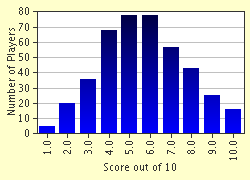Quiz Answer Key and Fun Facts
1. My name is William Goffe, though my nickname is "Praying William" owing to my ceaseless prayers, especially for our Lord Protector, Oliver Cromwell. It would be impossible to understand the enormity of the crimes of Charles I or to appreciate our forbearance with his wickedness without understanding the variety of purity we who came to be called "Puritans" sought. What sort of purification did we most eagerly seek?
2. Though we Puritans believed that each man of conscience must most earnestly and dilgently examine Holy Scripture for himself and that inevitable minor divisions of opinion must be tolerated, do not suppose that we had any proclivity to endure views clearly inimical to the plain truths of Scripture. The party of our Lord Protector Cromwell championed tolerance for those adhering to Christian fundamentals. But which of the following groups would be automatically excluded from this toleration?
3. Charles I encouraged the Church of England to afflict Puritans. His Archbishop of Canterbury most zealously carried out his master's wishes. The Archbishop prevailed on the Star Chamber to subject to cruel torture one unfortunate soul who committed no greater crime than having the boldness to print a pamphlet pointing out that the rule of bishops was both against Holy Scripture and satanic. Who was this evil Archbishop of Canterbury?
4. Because we Puritans controlled the House of Commons and legislated against his interests, Charles I dissolved Parliament and sought to rule without Parliament for 11 years, the longest period without Parliament in English history. The King's behavior provoked our own. The King had committed all but which one of the following outrages in the years prior to the Parliament of 1628?
5. On November 3, 1640, the Long Parliament convened, and we began the process of divesting the King of his despotic powers and the work of cleansing the English Church of her many heresies. The King resisted at every turn and ultimately refused our generous offer of compromise. To which of the following did we *not* ask the King to assent?
6. Truly, the policies of our vain, boastful and foolish monarch did produce a sad division of loyalties and interests. His taxation, wars, religious persecutions and disregard of English liberties left Charles I without sufficient support to resist the righteous cause of Parliament. The majority of which of the following groups favored the king at the outset of the English Civil War in 1642?
7. Despite the righteousness of our cause and the favor of Almighty God, we Puritans did not fare well during the first months of fighting. However, aid came from the North in the form of Scottish troops rallying to our cause. What induced the Scots to support Parliament during the English Civil War?
8. Oliver Cromwell commanded the New Model Army cavalry and never lost an engagement. As King Charles' armies now suffered defeat at every turn, his wife and son took refuge on the Continent. Charles himself surrendered to the Scots on May 5, 1646. In which of the following activities did the troops of Cromwell's new model army engage?
9. Charles escaped his captors and fled to Scotland. Recaptured, numerous attempts to reach terms for a restoration to the throne were made but they were unsuccessful. Following the expulsion from the House of Commons of Royalists and Presbyterians, the Commons passed a law declaring that a king who warred on Parliament was guilty of treason. The House of Lords would not pass the bill. How did it become law?
10. In a last attempt at compromise, army leaders offered to restore Charles if he would but confiscate bishops' estates and give up his veto over Parliamentary legislation. The King refused. At his trial Charles denied the authority of the court to try him. A panel of between 60-70 judges considered his case. Fifty-nine of us signed his death warrant. All but which of the following attempts were made to avert regicide?
Source: Author
uglybird
This quiz was reviewed by FunTrivia editor
bloomsby before going online.
Any errors found in FunTrivia content are routinely corrected through our feedback system.

